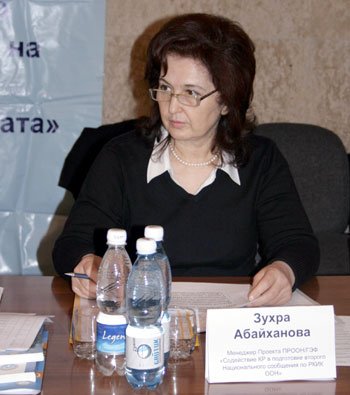SMALL COUNTRY, BIG STEPS

Ms Zuhra Abaihanova, the UNDP advisor on climate issues, at work in her office.
BY VITALY POJARSKY
The Kyrgyz Republic might be a small country but it has ratified the Kyoto Protocol and is taking big national-level measures to combat climate change
“Our planet needs more than just action by governments and corporations; it needs each one of us. Although individual decisions may seem small in the face of global threats and trends, when billions of people join forces for a common purpose we can make a tremendous difference.”
That was UN Secretary-General Ban Ki-moon addressing the world this year on World Environment Day.
For those who live in developing countries where governments are unable to spend much on climate change issues, the efforts of groups who are taking actions on climate change can be of vital significance.
Colossal task
As part of the commitment to the Convention, Kyrgyzstan had to prepare ‘National Communications' on Climate Change.
It was Ms. Zuhra Abaihanova, the UNDP Advisor on Climate Issues, with her dedicated team who completed the colossal task of developing the two National Communications.
When they started working they had to deal with three main tasks – to find out the effect of climate change on Kyrgyzstan, to define the country's level of greenhouse gas emissions in the global atmosphere and to develop adaptation measures to climate change.
For outsiders, these tasks may seem like a piece of cake – you just sit in a comfortable office sweating over facts and figures and writing a conclusion. But in reality it's only the tip of the iceberg.
“To prepare a National Communication is not the same as to write a usual report,” comments Zuhra Abaihanova.
“Although such communications have a standard list of sections, they are not limited to a simple description, and we may call it a national communication process. We can clearly see that the process itself is as important as the final paper.”
Greenhouse gas inventory
A lot of different initiatives have been taken up during the preparation of these national reports.
Besides drawing up a greenhouse gas inventory, analyzing climate change impacts within the country's provinces, developing adaptation measures to climate change, Ms. Abaihanova and her team drafted two important bills – “On the Renewable Sources of Energy” and “On the Policy and State Regulations of Greenhouse Gas Emissions”.
Thus, a substantial step towards development of the major legislation for climate change issues has been made.
Possible climate scenarios
The working group has developed possible scenarios of Kyrgyzstan's climatic conditions for the end of the 21st century, when the redoubling of CO2 - the basic greenhouse gas - is expected.
It turned out, for example, that according to the data of a series of stations, the 30-year period of 1961-1990 was warmer than the previous 30-year period 1931-1960 by about 0.5-1°C (in winter by 1-2°C).
At the same time, the precipitations at most of the stations have decreased.
For Kyrgyzstan, a mountainous country situated far from oceans and seas, with a sharp continental climate, global warming can have disastrous consequences.
By 2100, according to estimations, the number of glaciers may have decreased from about 8,000 to 142 and the river flow may have reduced twice.
So, even the most optimistic scenario for Kyrgyzstan could be pessimistic.
But what is the motivation that drives Ms. Zuhra Abaihanova?
'Unlimited, like the ocean'
“The topic of climate change is unlimited just like an ocean, she says.
“When we talk about ecological conventions a typical misconception is that they deal with nature protection solely. In fact, they do not. Climate change is our economy, habitat, is the preservation of our Earth in the end. We understood that we couldn't wait till tomorrow, we had to take measures today.”
Zuhra Abaihanova is particularly proud that the National Communications on Climate Change report she worked on has not been shelved as it often happens with such documents.
Adaptation to climate change is included as a single point to the National strategy of development of Kyrgyzstan for 2009-2011. In her opinion, that's a great success and public recognition of her work.
Very few countries in the world can boast of this.
Vitaly Pojarsky is a correspondent of the leading Kyrgyzstan weekly newspaper ‘Delo #' that has a circulation of 20,000 copies a week. Vitaly has eight years of experience in Journalism. His areas of specialization are politics, economy, social issues, youth problems and ecology. He holds a Bachelor's Degree in International Journalism from Kyrgyz-Russia Slavonic University in Bishkek and is currently doing the Erasmus Mundus Master in Journalism and Media.